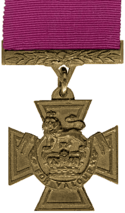John Buckley (VC) facts for kids
Quick facts for kids
John Buckley
|
|
|---|---|
 |
|
| Born | 24 May 1813 Stalybridge, Cheshire |
| Died | 14 July 1876 (aged 63) Poplar, London |
| Buried | |
| Allegiance | |
| Service/ |
|
| Years of service | 1832–1861 |
| Rank | Major |
| Battles/wars | Indian Mutiny |
| Awards | Victoria Cross |
Major John Buckley was a brave English soldier. He was born on May 24, 1813, and passed away on July 14, 1876. He received the Victoria Cross (VC), which is the highest award for bravery in the British military. Buckley was the 115th person ever to receive this special medal. He was also the first of many soldiers to earn the VC during the Indian Mutiny.
Contents
Early Life and Military Career
John Buckley was born in Stalybridge, Cheshire, on May 24, 1813. As a young man, he worked in textile mills. But he wanted to do more with his life. In 1831, he decided to join the army. He signed up for the Bengal Artillery in Manchester.
In 1832, he traveled to India to join his unit. Life in India was tough. He married Mary Ann Broadway in 1835. Sadly, his wife and two of his three children died from tropical diseases. He married again in 1846 to Esther Hunter. But more sadness followed, as his surviving daughter and two sons from his second marriage also passed away.
Despite these personal challenges, Buckley continued his military career. He was promoted to Corporal in 1840. Later, he became a Sergeant in 1853. Because he could speak several Indian languages, he got a special job. He worked with the Bengal Veterans' Establishment. By 1857, he was a Staff Conductor. He moved to Delhi with his wife and three children. There, he worked at the Great Magazine, which was a large storehouse for weapons and ammunition.
Heroic Actions at Delhi
In 1857, a major uprising called the Indian Mutiny began. John Buckley was 43 years old at this time. He was working at the Great Magazine in Delhi, India. On May 11, 1857, a large group of rebels attacked the ammunition storehouse.
Buckley and eight other brave men defended the magazine. They fought for more than five hours against many attackers. When it became clear they could not hold out much longer, they made a difficult decision. To stop the rebels from getting the weapons, they decided to blow up the ammunition.
This huge explosion killed many rebels. Sadly, five of the nine defenders died in the blast. Another died shortly after. But John Buckley, George Forrest, and William Raynor survived. For his incredible bravery that day, Buckley was awarded the Victoria Cross. His award was officially announced in the London Gazette.
Life After the Mutiny
After the explosion, John Buckley was captured by the rebels. He learned that his entire family had been killed. He was heartbroken and wanted to die. But his captors refused to kill him because they respected his bravery.
When he escaped and returned to the British lines, Buckley volunteered for many dangerous missions. He was present at the Battle of Badli-ki-Serai in June 1857. He became ill several times but survived. He was later promoted to Lieutenant in 1858.
Buckley returned to Britain in July 1858. On August 2, 1858, Queen Victoria herself presented him with his Victoria Cross. This special ceremony took place on Southsea Common in Portsmouth.
He later went back to India. John Buckley retired from the army as a Major in 1861. He then returned to England. He lived in Poplar, London, with his final wife, Sara. He passed away on July 14, 1876, at the age of 63. He was buried in Tower Hamlets Cemetery Park.
The Victoria Cross Medal
John Buckley did not have any direct children who survived him. However, his great-niece lived until 1955. After her passing, his Victoria Cross medal was bought by the Royal Army Ordnance Corps for a large sum of money. Today, his Victoria Cross is on display at The Royal Logistic Corps Museum in Camberley, England.
Commemorations and Legacy
John Buckley's bravery is remembered in several ways:
- A special blue plaque honors his life at the Travellers Call public house in Stalybridge, his hometown.
- Buckley Barracks in Hullavington, Wiltshire, is named after him. This is a home for the 9 Regiment Royal Logistic Corps.
- Buckley House, a building at the Defence Storage and Distribution Centre in Bicester, is also named in his honor.
For 136 years, John Buckley's grave was unmarked. But in 2012, it was found by Doreen Kendall. Two years later, on July 14, 2014, a headstone was placed on his grave. A ceremony was held, attended by important people, including soldiers from the 9 Regiment Royal Logistic Corps.
 | Victor J. Glover |
 | Yvonne Cagle |
 | Jeanette Epps |
 | Bernard A. Harris Jr. |

